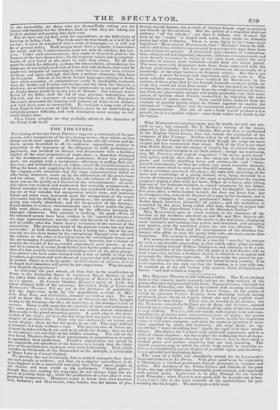What Maaseitsuat's original opera may be worth, we will not
pre- tend to say; but certainly Mr. F. Rostioes version of the music, adapted to Mr. AIalie LIMON'S libretto, Rob of the Fen, as performed at the English Opera-house, does not sustain the reputation of the composer of Der Tramper. Neither will it be of much service to the theatre ; for the drama is ridiculously dull, though the songs are more elegant and less nonsensical than usual. Rob of the Fen is no other than Robin Hood ; but the change of locality has so altered him, that no one would have recognized the bold outlaw; though his representa- tive, Mr. FRASER, sings a good song about "the merry green-wood with spirit ; and his men, who arc also vocal, are dressed in Lincoln green, and twiddle plaything bows and arrows—the said " sharp. pointed instruments," as they are called, very much resemble skewers, and seem more fitted to truss geese than kill venison. Moreover, Rob is but a secondary person in the piece ; the main plot consisting of the woes arid wanderings of a young damsel, who, being detected by a chorus of witnesses (assembled in the SHOW at midnight for the express purpose) singing a duet with her lover, Edgar de Courcy, after letting him out of her bedroom-window, is cursed extempore by her father. The old man takes it so to heart, that when his daughter meets him five years after, a white-headed hermit, she does not know him : but he recognizes her, even in the disguise of a page to her husband ; and is very near strangling the young gentleman's father in consequence. Rubin Hood, however, reconciles all parties ; and his usefulness is rewarded by the piece being culled after him, though its proper title would be " The Superfluous Curse, or the Mistaken Father." Miss RAINFORTII gave as much interest to the character of the heroine as the incidents admitted of, and Mr. and Mrs. SEGUIN effi- ciently aided her exertions ; but the music is dry and heavy, displaying more ingenuity and learning than genius and invention, and excepting one quartet, even the concerted pieces are not very effective. The jovialties of Friar Tuck, and the facetiousness of the drunken inn- keeper, who offers to beat his pretty little wife, are more coarse than humorous. The scenery is strikingly picturesque.
The management must be sadly at a loss fur " novelty," to venture on such a questionable proceedieg as that which takes place to-night.
A youth culling himself William Shakspeare, and claiming to be a col- lateral descendant of the family—for the poet, it is well known, left no male issue—has written a dramatic sketch, in which he is to appear and personate his illustrious namesake. If he is really the person he pre- tends, the attempt is ridieulous, whatever talent he may possess : if he is till impostor, we can only say that the humbug is a very silly one. It reminds us of the old woman who used to show. SIIAKSPEARE'S house, " and had written a tragedy."


























 Previous page
Previous page